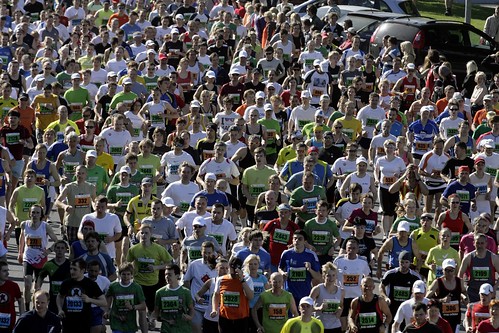 Marathon running has become a rather strange social phenomenon over the past decade. It is one that I can’t say that I fully comprehend given the history of running in this country.
Marathon running has become a rather strange social phenomenon over the past decade. It is one that I can’t say that I fully comprehend given the history of running in this country.
There was a time not so long ago – maybe 30 or so years ago – when training for a 5K was the departure point for new and experienced runners alike. This was during the initial “running craze”, when many people turned to running as a way to get up and move and get active. After you ran a few 5Ks, it was a natural progression in thinking to run a 10K. Maybe you would, maybe you wouldn’t. Then, you might decide to progress to a half marathon. You rarely had people going into the sport at the marathon end of the spectrum.
Somewhere along the line, running a marathon entered into the collective psyche of the couch potato.
In the same breath, it began appearing on bucket lists of many who barely walked across the room for the bag of Cheetos, let alone went out and ran a mile or two. Somewhere in the midst of all of this, training groups promoted the concept of “run a marathon in 26 weeks”. Sedentary people were jumping into running not with the goal of a 5K, but with the 26 week program to run a marathon.
What started out as a very methodical approach to running morphed into something completely different.
Back in the early days of the running boom, it was truly “running as a lifestyle”. But that was also at the same time as when people not only wanted to run a 5K, but they then wanted to train to run them faster. The marathon, for all intents and purposes, was a self-limiting group composed of all the “crazy” runners. You had to be crazy to run one of those things. Or so they thought.
Now, running a marathon has became more of a social phenomenon than it is about a natural progression of your running. It became a means of fundraising. It became a way to get out of the house (or work) for more and more “long runs”. Group training runs became a social event. There has been huge growth at many marathons across the country, and registration fees are skyrocketing. The medal of running honor is now to slog through a marathon, when at one time it was to push your 5K time down.
I am a strong advocate of people getting moving. I am a strong believer in the value of exercise – physically, mentally, and perhaps even spiritually (in a non-traditional, non-religious way). But I am not sure where, how and when a marathon enters into your psyche, makes an appearance on your “bucket list”, when you are barely active at all.
There are plenty that approach running from the marathon end of the spectrum and become life-long runners. But with that said, I see far too many that either get injured in the process or simply walk away from the sport once they have crossed the finish line. This is sad to see when then true long-term benefits of running – the active lifestyle – is lost in the mix. The long-term benefits of a consistent, injury-free running program are important – the marathon medal hanging on the wall isn’t.
Photo credits: Nordea Riga Marathon

 "Running Injuries: Etiology And Recovery- Based Treatment" (co-author Bridget Clark, PT) appears in the third edition and fourth editions of "Clinical Orthopaedic Rehabilitation: A Team Approach" by Charles Giangarra, MD and Robert C. Manske, PT.
"Running Injuries: Etiology And Recovery- Based Treatment" (co-author Bridget Clark, PT) appears in the third edition and fourth editions of "Clinical Orthopaedic Rehabilitation: A Team Approach" by Charles Giangarra, MD and Robert C. Manske, PT.
 Allan Besselink, PT, DPT, Ph.D., Dip.MDT has a unique voice in the world of sports, education, and health care. Read more about Allan here.
Allan Besselink, PT, DPT, Ph.D., Dip.MDT has a unique voice in the world of sports, education, and health care. Read more about Allan here.
 Top 5 finalist in three categories: "Best Overall Blog", "Best PT Blog" and "Best Advocacy Blog".
Top 5 finalist in three categories: "Best Overall Blog", "Best PT Blog" and "Best Advocacy Blog".